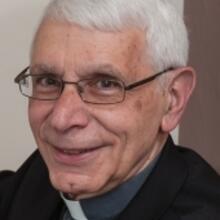A Theologian in Verse
We are in the midst of a wonderful renaissance of translations and studies of The Divine Comedy in the United States. The past 15 years alone have seen translations of one or all three of the poem’s Cantica by such fine poets and scholars as Robert Pinsky, Robert and Jean Hollander and Anthony Esolen. (And that is not a complete list!) A number of colleges and universities continue the venerable tradition of lectura Dantis, the reading and exposition of a canto of the Comedy in a public forum. At Boston College, we have reached the midpoint of the Purgatorio in this seventh year since the inception of the monthly public readings.
Still, Dante remains daunting. If T. S. Eliot was right to say that Dante and Shakespeare divide the world of literature between them, there is no doubt that Dante requires the greater number of footnotes. We are thus most fortunate to have Peter Hawkins’s Dante: A Brief History to guide our passage through the dark descent, up the steep mount and aloft on the wings of desire that at last attains its goal: union with the blessed Trinity.
Hawkins, a professor of religion at Boston University, previously wrote a penetrating study entitled Dante’s Testaments: Essays in Scriptural Imagination. His new book, in Blackwell’s Brief Histories of Religion series, is more modest but no less impressive.
An accessible writing style, small format and attractive contemporary art will make the book appealing to readers new to Dante. Those proficient in Dante will also delight in the many new perspectives and insights the author provides.
An introductory chapter on Dante’s Life and Works leads to the central chapters that treat Dante’s Journey to God, Dante’s Beatrice and Dante’s Religion. The book concludes with an excursion into Dante’s Afterlife, which ranges from Chaucer through Seamus Heaney to New Yorker cartoons. My favorite cartoon depicts a procession of lost souls passing through the portal of Hell, above which is inscribed the well-known Dante verse: Abandon All Hope, Ye Who Enter Hereto which there is an addendum: If you have already abandoned hope, please disregard this notice.
Hawkins succinctly, but strikingly, contrasts Dante’s Hell and Purgatory: Hell [is] all about repetition-compulsion, an endless replay of the sinner’s song of myself’. It is fitting that at Hell’s nadir we find not fire, but Satan frozen immobile in ice. The promise of Purgatory lies, instead, in dynamic movement, moto spiritale, dedicated to change and transformation. For here the issue concerns the rebirth of a soul free at last to be interested in other souls and other things.
In Paradiso, sadly the least read of the Cantica, the poet summons the full measure of his genius to attempt the inexpressible: the verbal expression of the consummated at-onement of humanity in the communion of saints. He conjures images of light, choreographs ecstatic patterns of dance and mints mind-stretching neologisms. Yet the struggle to forge an apt language is absolutely necessary. For Dante, as Hawkins reads him, poetry is the agent of the new life;’ it is not the bridesmaid of theology, but the bride herself. Dante scorns false modesty!
In the chapter on Dante’s Beatrice, the eros/agape theme comes fully to the fore. Hawkins wrestles, as we all must, with the figure of Beatrice and confesses that here, perhaps, Dante was trying to do too much, endowing her with a surfeit of meanings, thereby risking the loss of her person’s meaning and mystery. I hesitate to challenge Hawkins’s considered view. Yet I wonder whether the very abundance of meaning, which he decries, hints at the surpassing mystery of Beatrice’s person and the comprehensiveness of the salvation she mediates.
As Hawkins acknowledges in his very suggestive chapter on Dante’s Religion, the Commedia abounds with mediations of Christ, most prominently Mary and Beatrice. Rather than signaling Christ’s absence from the poem, these figures proclaim his all-pervasive presence. Likewise, every instance of transformation Dante sets before us serves to refract, in the ongoing history of salvation, Christ’s paschal mystery. Only thus can eros be transfigured, losing nothing of its humanity, but gaining everlasting life.
Today we encounter considerable discussion and writing about Catholic identity, about what is distinctive to the Catholic spiritual and intellectual tradition. Favorite terms mustered by way of response include incarnational and sacramental. These concepts are indeed characteristic and crucial. But Dante’s great poem impels the confession that flesh and blood can mediate grace only because God’s eternal Word became flesh and blood, became incarnate. The universe can be truly sacramental only if transfigured by what the tradition of the Christian East calls Taboric light.
Only a transformative journey, like the one Dante himself undertakes, will purify the erotic of its residual narcissism, freeing it to vibrate in harmony with the Love that moves the sun and the other stars.
In this splendid vade mecum to Dante, Hawkins argues that the 14th-century Italian poeticized in the conviction that he had a divine calling to reform the world and transform the reader. Dante can, of course, be approached simply as a superb fabricator of words, rather than as an inspired prophet. Nonetheless, Hawkins contends, no one remains unchanged by an encounter with the Commedia. And then, like the surgeon general, he warns: There are consequences to picking it up. Caveat lector!
This article also appeared in print, under the headline “A Theologian in Verse,” in the May 7, 2007, issue.








